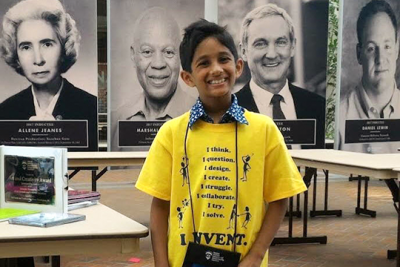



Cutting-edge inventions created by the nation’s brightest young innovators from colleges and universities across the country were on display November 3 at the 2017 Collegiate Inventors Competition, held at the United States Patent and Trademark Office (USPTO) headquarters in Alexandria, Virginia.
Solving challenges from water decontamination to wearable power generation, 29 undergraduate and graduate students from 12 teams of finalists attended the competition’s public expo. It provided the students a forum to answer questions and discuss their inventions with USPTO patent examiners, patent attorneys, trademark examiners, corporate sponsors, members of the intellectual property community, and the public.
Prior to the expo, the finalists had the opportunity to interact one-on-one with inductees of the National Inventors Hall of Fame (NIHF). These legendary innovators, who have invented many tools, processes, or devices that are now commonplace in our lives (like the optical fiber, implantable defibrillator, Post-it Notes, digital camera, and more), served as judges for the competition and provided advice and inspiration for the students. USPTO officials also served as judges.
Abraham Espinoza and Matthew Rooda from the University of Iowa took top honors in the undergraduate division. Their invention, SwineTech, is an audio-processing technology that stops sows from accidentally crushing their piglets, saving farmers money.
The graduate winner was Ning Mao from Boston University for Engineered Probiotics. Her probiotic solution is an affordable and convenient way to provide early detection of cholera and help further contain the spread of the disease.
“It’s very rewarding to see my invention potentially help with a certain problem and have a social impact. I think it’s very exciting to take on the challenge of trying to solve a real world problem,” Mao said.
The top undergraduate and graduate winning teams each received $10,000. Second and third-place winners received cash and prizes. Read more about all the 2017 CIC finalists and winners and hear what they love about inventing.
The skills these students gained through the competition, the process of invention, and by learning about intellectual property will help them as they continue with their research or commercialize their inventions.
Applications for the 2018 competition will open this spring. Students at any U.S. college or university with an original invention are encouraged to apply. More information is available about the application process.
The Collegiate Inventors Competition is one of several programs that the USPTO and NIHF offer to inventors of all ages. Other programs include Invention Playground for preschool children, Camp Invention and Club Invention for elementary school children, and Invention Project for middle school students. Since 1990, NIHF’s education programs have served more than 1.25 million children and 125,000 teachers and leadership interns, promoting a better understanding of the vital role intellectual property and innovation play in our lives and our economy, and helping build entrepreneurial skills for the next generation of inventors.
The USPTO gives you useful information and non-legal advice in the areas of patents and trademarks. The patent and trademark statutes and regulations should be consulted before attempting to apply for a patent or register a trademark. These laws and the application process can be complicated. If you have intellectual property that could be patented or registered as a trademark, the use of an attorney or agent who is qualified to represent you in the USPTO is advised.